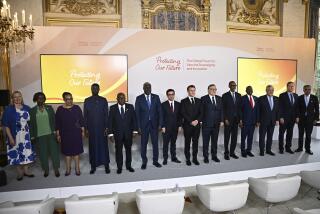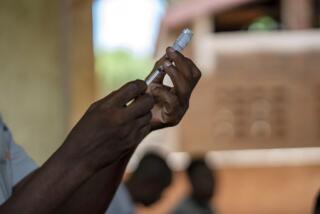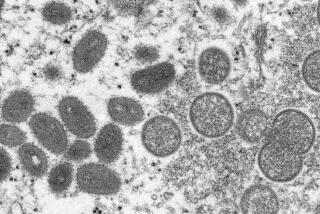Nigeria Has AIDS War Plan
UNITED NATIONS — Setting a precedent for the rest of Africa, Nigeria is planning to launch the continent’s largest AIDS treatment program next month using cheap generic drugs, a U.N. special envoy said.
Starting Sept. 1, 10,000 adults and 5,000 children will receive a government-subsidized cocktail of antiretroviral drugs designed to combat the symptoms of AIDS, said Stephen Lewis, the U.N.’s special envoy for HIV and AIDS in Africa.
“It’s a quite extraordinary intervention, a measure of the president’s determination that they maintain the level of the pandemic where it is and try to turn it back,” Lewis told reporters at U.N. headquarters Monday. “They recognize that if Nigeria fails, then much of Africa will fail.”
The experimental program involves just a fraction of the estimated 2.6 million people in Nigeria who have HIV, the virus that causes AIDS. But Lewis said it underlined the country’s commitment to tackle the disease that has infected 26.5 million people across Africa, the world’s hardest-hit continent.
Until this year, many African leaders maintained that AIDS was not a problem in their nations, and on Monday, South African Catholic bishops condemned the use of condoms as an “immoral and misguided weapon” in the fight against AIDS.
But Nigerian President Olusegun Obasanjo has been a leader in Africa’s struggle against the pandemic. At the U.N. Conference on AIDS held in June, he warned of “the extinction of an entire population of a continent” and argued for cancellation of Africa’s debts so it could marshal its resources against the disease.
The government also took independent steps, including hosting a Harvard School of Public Health study of health systems in three Nigerian states. The research is funded by a $25-million grant from the Bill and Melinda Gates Foundation.
And earlier this year, Nigeria sent its health minister to India to negotiate a special deal with Indian pharmaceutical company Cipla to supply an inexpensive, generic version of a three-drug cocktail. Cipla had originally offered the treatment to developing countries’ governments for $600 per person annually, and to nonprofit organizations for $350 each, but the Nigerian health minister secured the lower price for the country in April, Obasanjo said.
The treatments will be administered by Nigeria’s teaching hospitals, and patients will have to pay between $7 and $8 a month to receive the drugs. Part of the program is a comparison between two treatment regimens, with 60% of the patients receiving a six-drug cocktail and 40% taking a two-drug combination, Lewis said.
“We’ve all heard of the alleged crippling constraints--from the tatters of the health infrastructure, to the absence of human resources, to bureaucracy that doesn’t work,” he said. But after meeting with leaders and grass-roots organizations in Kenya, Rwanda and Nigeria during a recent visit, he said he was confident that “there is tremendous progress to be made in the face of the obstacles.”
African leaders, he said, are anticipating help from the newly created Global AIDS and Health Fund, founded by U.N. Secretary-General Kofi Annan in April.
The fund has so far received $1.4 billion in contributions and pledges from governments, foundations, businesses and private citizens, but “much, much more is needed,” Annan told the National Urban League in Washington on Monday. He estimated that the world needed to spend $7 billion to $10 billion a year more to stem the spread of AIDS.
On Monday, Annan appointed former Ugandan Health Minister Crispus Kiyonga to get the fund up and running by the end of the year.
More to Read
Sign up for Essential California
The most important California stories and recommendations in your inbox every morning.
You may occasionally receive promotional content from the Los Angeles Times.









